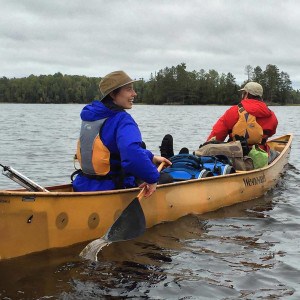
A couple weeks into their year of living in the Boundary Waters, Dave and Amy Freeman have been featured in a NPR story about the wilderness and adjacent mine proposals. The article features the couple’s ambitious adventure and their concerns about the potential Twin Metals mine neighboring the South Kawishiwi River. It also includes pro-mining voices who tout Minnesota’s strong environmental review process and the need for copper and nickel.
The story has received intense interest. It was shared on Twitter 325 times and 1,900 times on Facebook in the first day after publication. There were 145 comments about it on NPR’s website.
NPR digital reporting intern Kylie Mohr reports that the Freemans’ 12-month trip as a significant challenge they are willing to undergo because of their love of the wilderness and to help raise awareness of pollution threats from copper-nickel mining. “A year without a shower takes a tremendous amount of dedication and passion,” she writes.
The adventurers are not the only voices in the article. While Twin Metals declined to comment, Mohr does quote spokesman Bob McFarlin from a Minnesota Public Radio story last year. Also interviewed were Frank Ongaro of Mining Minnesota, the trade association for copper mining companies in the state, and Dave Lislegard, a pro-mining city council member from the Iron Range city of Aurora.
Ongaro praised Minnesota’s strict environmental laws, and made the point that modern life requires the metals that would be extracted.
“Wind turbines, electric cars, you name it, they all take metals and we are import dependent on these metals from countries that have little or no environmental standards, don’t have safety requirements, have child labor violations. We need to hold up a model to the world on how to do it right,” Ongaro said.
America’s dependency on metals has been complicated this September. A drop in global demand has recently driven down copper prices, and led to declines in profits and share prices at the two massive corporations behind Minnesota’s mine proposals. Swiss conglomerate Glencore, which is financing the PolyMet proposal and owns about a third of the company, recently lost of a third of its value in one catastrophic day. The reason is largely China’s slowing economy, which is consuming much less copper. Not only is demand down, but stockpiles are at all-time highs.
“Even as producers slash output, the world will be stuck with a surplus of 485,000 tons of copper, 18 percent more than last year. As a result, Goldman expects copper prices in 2015 to average about $5,670 a ton, 17 percent lower than in 2014,” Bloomberg BusinessWeek recently reported.
Antofagasta PLC, the Chilean company that now wholly owns Twin Metals, reported its profits were down 50 percent for the first half of this year.
Shortly after setting out, the explorers alluded to these market forces in a comment on Facebook responding to criticisms that they were using metal to stay in communication during the trip.
“You’re correct that maintaining these relationships require communications technologies that contain copper, but our choice isn’t only between protecting the Boundary Waters and using copper. In fact, the world has plenty of copper as there’s currently a global surplus of copper and recycling already accounts for about half of the US copper supply, and the share could stand to grow considerably more,” they wrote.
Hopes remain high for the industry to create jobs and economic development in northern Minnesota. Aurora city councillor Lislegard expressed frustration with the Freemans trip.
“It’s really hard for many of us who are trying to provide for our families to understand how individuals can stop working for a year and go camp,” he told NPR.
Responding to the Freemans’ belief that mining threatens the many tourism jobs in the region – including theirs, as wilderness guides – Lislegard downplayed the sector’s economic impact.
“Mining is the meat and potatoes,” Lislegard told NPR. “Tourism is the dessert. It looks good, it tastes good, it smells good — but you can’t live on it.”
According to a report on the economic impact of the Boundary Waters published by Northeastern Minnesotans for Wilderness, the region surrounding the wilderness has been living on “dessert” for a couple decades. Economist Spencer Phillips found that the service sector, which includes everything from tourism to health care. While mining has declined from employing 12,000 people in 1979 to between three and five thousand today, service industries make up 70 percent of the current workforce.
As the state debates the prospect of copper-nickel mining, the Freemans are busy with the daily routine of life in canoe country as the days get shorter and colder. Living through a full winter in the wilderness will require no small effort.
“A year is a long time, mentally and physically,” Dave told NPR. “If we’re being honest, it will probably wear on us. Winter is going to be really hard. It takes a lot of energy to stay warm and healthy when it’s well below zero.”
On Sunday, they reported on Instagram that had risen early to watch the sunrise:
“It is hard to leave warmth of the wood stove early in the morning before the sun’s rays have brought warmth to the land, but braving the morning chill is a small sacrifice compared to the mist covered lake that awaits us just outside our tent. Nothing compares to floating quietly on a Wilderness lake soaking in the silence, watching the sun slowly burn through the fog. Watching the light glisten on the frost as it slowly disappear from the marsh grasses and aluminates the trees on the western shore.”

